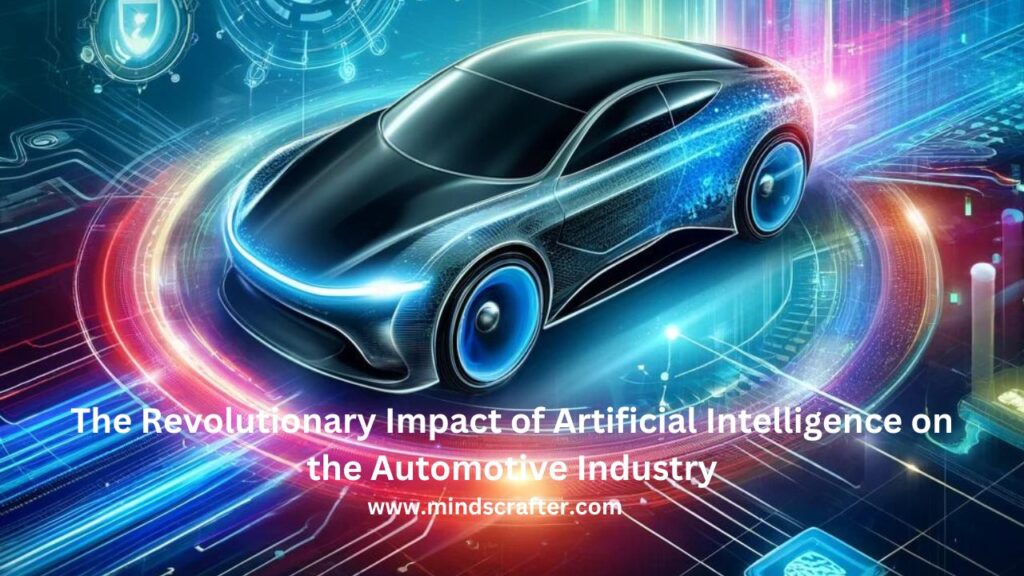
The Revolutionary Impact of Artificial Intelligence on the Automotive Industry
Introduction:
The automotive industry is undergoing a profound transformation, driven by the integration of artificial intelligence (AI). As AI technology continues to evolve, its applications in the automotive sector are expanding, leading to significant advancements in vehicle design, manufacturing, safety, and customer experience. This article delves into the revolutionary impact of artificial intelligence on the automotive industry, exploring its current state, benefits, challenges, and future prospects.
AI in Vehicle Design and Development:
Enhanced Design Processes
AI has revolutionized the way vehicles are designed. Advanced algorithms analyze vast amounts of data to optimize vehicle shapes, materials, and features. This process, known as generative design, allows engineers to create more efficient and innovative designs that were previously unimaginable.
Simulation and Testing
AI-powered simulations enable manufacturers to test vehicle performance under various conditions without the need for physical prototypes. This reduces development time and costs, while also improving the accuracy of safety and performance predictions.
AI in Manufacturing:
Automation and Robotics
AI-driven automation and robotics have transformed automotive manufacturing. Robots equipped with AI can perform complex tasks with precision, such as welding, painting, and assembly. This leads to higher efficiency, reduced errors, and lower production costs.
Predictive Maintenance:
AI algorithms analyze data from manufacturing equipment to predict potential failures before they occur. This predictive maintenance approach minimizes downtime and maintenance costs, ensuring smoother and more reliable production processes.
AI in Autonomous Vehicles:
Autonomous Driving Technology
The most prominent application of AI in the automotive industry is in autonomous driving. AI systems process data from sensors, cameras, and radar to enable vehicles to navigate and make decisions without human intervention. Companies like Tesla, Waymo, and Uber are at the forefront of developing self-driving cars.
Safety and Efficiency
AI enhances the safety and efficiency of autonomous vehicles. Advanced driver-assistance systems (ADAS) use AI to detect obstacles, pedestrians, and other vehicles, reducing the risk of accidents. AI also optimizes driving routes and reduces fuel consumption, contributing to environmental sustainability.
AI in Customer Experience:
Personalized Services
AI improves customer experience by offering personalized services. For example, AI-powered infotainment systems can recommend music, routes, and services based on the driver’s preferences and habits. This personalization enhances driver satisfaction and convenience.
Virtual Assistants
Virtual assistants, such as Amazon’s Alexa and Google Assistant, are being integrated into vehicles to provide hands-free control over various functions. These AI assistants can manage navigation, entertainment, and even vehicle diagnostics, making driving more enjoyable and efficient.
Challenges of Implementing AI in the Automotive Industry:
Data Privacy and Security
The implementation of AI in vehicles raises concerns about data privacy and security. Autonomous vehicles collect and process vast amounts of data, including personal information. Ensuring this data is protected from cyber threats is a significant challenge.
Regulatory and Ethical Issues
The deployment of AI in the automotive industry also faces regulatory and ethical challenges. Governments need to establish clear regulations for the development and use of autonomous vehicles. Ethical considerations, such as decision-making in critical situations, must be addressed to gain public trust.
Future Prospects of AI in the Automotive Industry:
Advanced Autonomous Systems
The future of AI in the automotive industry holds exciting possibilities. We can expect to see more advanced autonomous systems capable of handling complex driving scenarios and achieving full autonomy. This will revolutionize transportation by reducing traffic congestion, accidents, and emissions.
Connected Vehicles
AI will play a crucial role in the development of connected vehicles. These vehicles will communicate with each other and with infrastructure, sharing information to enhance safety and efficiency. For instance, AI can manage traffic flow, prevent accidents, and provide real-time updates on road conditions.
AI and Electric Vehicles
The synergy between AI and electric vehicles (EVs) is another promising area. AI can optimize battery management, charging infrastructure, and energy consumption, making EVs more efficient and accessible. This will accelerate the adoption of electric vehicles and contribute to a greener future.
Conclusion:
The revolutionary impact of artificial intelligence on the automotive industry is undeniable. From design and manufacturing to autonomous driving and customer experience, AI is transforming every aspect of the automotive sector. While challenges such as data privacy, security, and regulatory issues must be addressed, the future prospects of AI in the automotive industry are incredibly promising. As AI technology continues to advance, we can expect a more efficient, safe, and sustainable future for transportation.
